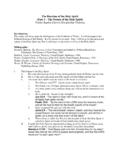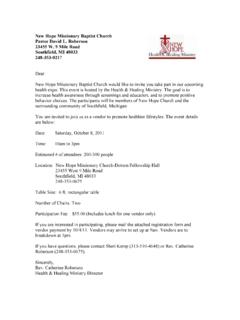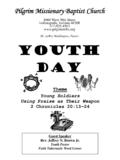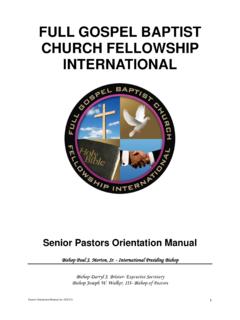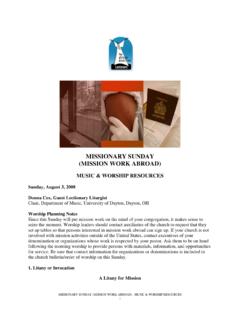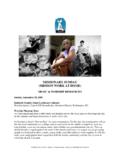Transcription of Missiology and Our Church Trinity Baptist Church ...
1 Missiology and Our Church Trinity Baptist Church discipleship training (December, 2013) Introduction: The suggested topic for this discipleship training study is Missions Within the Local Church the How, the What, and the Who. This topic falls into the area of practical theology known as Missiology . Missiology covers all of the aspects of the spread of the Christian faith including the theology, anthropology, geography, methods, and apologetics. Missiology demands an examination of people groups. For example, bringing the Gospel to Muslims in Afghanistan will demand a different method than bringing the Gospel to the urban people of France or Germany.
2 Missiology also includes the consideration of other aspects of the missionary enterprise such as social and economic assistance (medical assistance, education, care of the poor, as well as preaching). For this study, however, we will greatly narrow the scope to missions in the context of the particular ministry of Trinity Baptist Church . I. The What A. Definitions: 1. There has often been confusion over the terms missions and evangelism. Some have defined evangelism as involving local work and missions as reaching to the ends of the earth.
3 Some see evangelism as involving people within our own culture and missions as involving other cultures. 2. These definitions are good but do not get to the heart of the Great Commission Another way of looking at defining these terms: Evangelism is from the Greek word euvagge,lion (euaggelion). This is the word for Gospel. So evangelism is the spread of the Gospel. To evangelize is expose a person to the Gospel. We should look at evangelism as the product; the spread of the evangel or Gospel. This includes both near and far.
4 Missions involves the command to go. This also includes both near and far. Missions is the commissioned call of God to go bearing the evangel or Gospel. The Great Commission is the call to evangelize the world, from your own backyard to the ends of the earth. 3. From Christianity Today There is no biblical distinction between evangelism and missions, so with good motives, we are creating a distinction without a difference," said Ed Stetzer, LifeWay Research president and missiologist in residence. 2 B. The motivation: 1.
5 Historically, there have been many motivations for the missionary endeavor. For some it carried an ascetic view of life a life of self-denial. For others the motivation was to hasten the return of Christ. For still others it was a desire to extend the Western culture. This included the spread of colonialism. 2. For us we have primarily a two-fold motivation: a. Sympathy for those who do not know Christ b. The desire for obedience to Christ. Matthew 28:18-19 NAS - "All authority has been given to Me in heaven and on earth.
6 19 "Go therefore and make disciples" II. The Who A. The who of missions is all whom God has commissioned with the Gospel 1. This would include every believer. The Great Commission has several facets: a. To make disciples. A disciple is a follower of Christ. This is accomplished through evangelism. Evangelism is accomplished through the Word spoken and verified through our righteous lives. 1 Peter 2:12 NAS - "Keep your behavior excellent among the Gentiles, so that in the thing in which they slander you as evildoers, they may on account of your good deeds, as they observe them, glorify God in the day of visitation.
7 " 1 Peter 3:1-2 NAS - "In the same way, you wives, be submissive to your own husbands so that even if any of them are disobedient to the word, they may be won without a word by the behavior of their wives, 2 as they observe your chaste and respectful behavior." b. To incorporate them into the local Church Baptizing them c. To continue the work of discipleship by teaching the Word of God "teaching them to observe all that I commanded you" 2. There is no difference between a person bearing the Gospel at work or home and the person bearing the Gospel in a far away country.
8 If the person recognizes that he is sent and authorized by God, in both places he is a missionary B. This means that there isn t really a difference between a Church member evangelizing his neighbor and a person serving in the foreign mission field. 1. Both are on mission . The primary difference is the place of service. There will be some called of God to go but all are called to evangelize. 2. This must be our mindset regarding missions. It clarifies for us the concept of mission field. Parents should see their home as a mission field.
9 3 3. Many fear to make this statement in fear that foreign mission work will be lost. John Piper: I'm troubled when a pastor says, "Everybody is a missionary," unless he defines what missionaries do as something other than that. If everybody is doing missions, then very likely missions is going to be lost. 4. There is no danger as long as we recognize the full extent of the Great Commission. It demands carrying the Gospel to the ends of the earth. God has always given particular calls to particular people.
10 Peter s charge was to carry the Gospel to the Jews. Paul, however, was charged with carrying the Gospel to the Gentiles. Both were on mission. C. The Great Commission defines the who 1. It was given to the disciples the eleven Matthew 28:18 NAS - "And Jesus came up and spoke to them" The unconverted are not charged with carrying the Gospel to the lost. 2. The promise: Matthew 28:20 NAS - "I am with you always, even to the end of the age" This tells us that the Church would continue the mission until this present age comes to an end.


